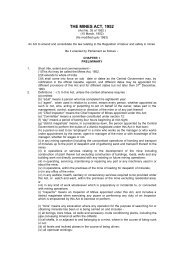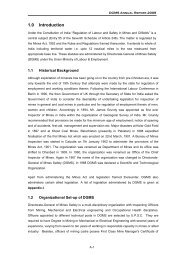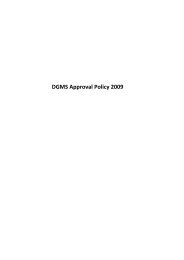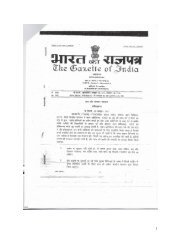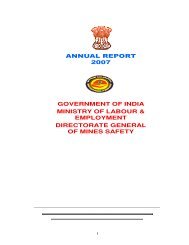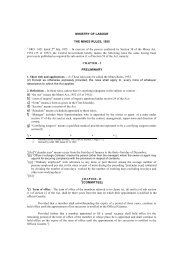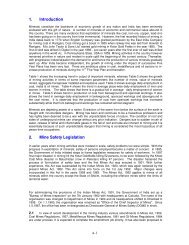India - Constitution - Directorate General of Mines Safety
India - Constitution - Directorate General of Mines Safety
India - Constitution - Directorate General of Mines Safety
Create successful ePaper yourself
Turn your PDF publications into a flip-book with our unique Google optimized e-Paper software.
Chapter III LegislativeArticle 123 Power <strong>of</strong> President to promulgate Ordinancesduring recess <strong>of</strong> Parliament(1) If at any time, except when both Houses <strong>of</strong> Parliament arein session, the President is satisfied that circumstances existwhich render it necessary for him to take immediate action, hemay promulgate such Ordinances as the circumstances appearto him to require.(2) An Ordinance promulgated under this article shall have thesame force and effect as an Act <strong>of</strong> Parliament, but every suchOrdinance -(a) shall be laid before both Houses <strong>of</strong> Parliament and shallcease to operate at the expiration <strong>of</strong> six weeks from thereassembly <strong>of</strong> Parliament, or, <strong>of</strong> before the expiration <strong>of</strong> thatperiod resolutions disapproving it are passed by both Houses,upon the passing <strong>of</strong> the second <strong>of</strong> those resolutions; and(b) may be withdrawn at any time by the President.Explanation: Where the Houses <strong>of</strong> Parliament are summonedto reassemble on different dates, the period <strong>of</strong> six weeks shallbe reckoned from the later <strong>of</strong> those dates for the purposes <strong>of</strong>this clause.(3) If and so far as an Ordinance under this article makes anyprovision which Parliament would not under this <strong>Constitution</strong> becompetent to enact, it shall be void.Chapter IV The Union JudiciaryArticle 124 Establishment and <strong>Constitution</strong> <strong>of</strong> Supreme Court(1) There shall be a Supreme Court <strong>of</strong> <strong>India</strong> consisting <strong>of</strong> aChief Justice <strong>of</strong> <strong>India</strong> and, until Parliament by law prescribes alarger number, <strong>of</strong> not more than seven other Judges.(2) Every Judge <strong>of</strong> the Supreme Court shall be appointed bythe President by warrant under his hand and seal afterconsultation with such <strong>of</strong> the Judges <strong>of</strong> the Supreme Court and<strong>of</strong> the High Courts in the States as the President may deemnecessary for the purpose and shall hold <strong>of</strong>fice until he attainsthe age <strong>of</strong> sixty-five years:Provided that in the case <strong>of</strong> appointment <strong>of</strong> a Judge other thanthe Chief Justice, the Chief Justice <strong>of</strong> <strong>India</strong> shall always beconsulted:Provided further that -(a) a Judge may, by writing under his hand addressed to thePresident, resign his <strong>of</strong>fice;(b) a judge may be removed from his <strong>of</strong>fice in the mannerprovide in clause (4).(2A) The age <strong>of</strong> a Judge <strong>of</strong> the Supreme Court shall bedetermined by such authority and in such manner asParliament may by law provide.(3) A person shall not be qualified for appointment as a Judge<strong>of</strong> the Supreme Court unless he is a citizen <strong>of</strong> <strong>India</strong> and -(a) has been for at least five years a Judge <strong>of</strong> a High Court or<strong>of</strong> two or more such Courts in succession; or(b) has been for at least ten years an advocate <strong>of</strong> a High Courtor <strong>of</strong> two or more such Courts in succession; or(c) is, in the opinion <strong>of</strong> the President, a distinguished jurist.





